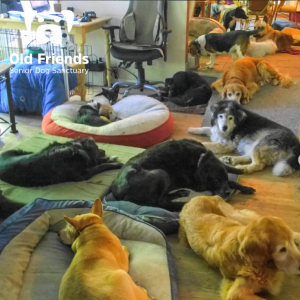
Senior Dog Health: 10 Common Problems and How to Manage Them
As dogs age, they become more susceptible to various health problems. While some of these problems are simply a natural part of the aging process, there are things you can do to help your senior dog stay healthy and comfortable.
Here are 10 of the most common health problems in senior dogs, along with tips on how to manage them:
1. Arthritis and joint pain
Arthritis is a common condition in senior dogs that can cause joint pain and stiffness. This can make it difficult for your dog to move around and participate in activities they once enjoyed.
To manage arthritis and joint pain, it’s essential to keep your dog at a healthy weight and provide them with regular exercise. Some supplements and medications may help alleviate their pain. Additionally, providing your dog with a comfortable and supportive bed can help reduce pressure on their joints.
Signs and symptoms of arthritis in senior dogs include:
- Difficulty getting up and lying down
- Limping or stiffness
- Reluctance to go for walks or climb stairs
- Yelping or wincing when touched in certain areas
- Licking or chewing at the joints
- Swollen or red joints
- Loss of muscle mass
- Changes in behavior, such as becoming less playful or irritable
Treating Arthritis and Joint Pain in Senior Dogs
There is no cure for arthritis, but several things can be done to manage the pain and inflammation and improve your dog’s quality of life. Treatment options include:
- Weight management: Excess weight puts additional stress on the joints, so keeping your senior dog at a healthy weight is essential.
- Exercise: Regular exercise helps to keep the joints lubricated and mobile. However, avoiding high-impact activities or putting too much stress on the joints, such as running or jumping, is essential.
- Diet: A healthy diet can help to reduce inflammation and support joint health. Look for a food that is high in protein and omega-3 fatty acids.
- Supplements: Several supplements can help to improve joint health and reduce pain, such as glucosamine, chondroitin, and omega-3 fatty acids.
- Medications: Sometimes, your veterinarian may prescribe pain or anti-inflammatory medication to help manage your dog’s pain.
2. Cognitive dysfunction syndrome (CDS)
CDS, also known as canine dementia, is a progressive condition that can cause changes in your dog’s behavior and cognitive function. Symptoms of CDS may include disorientation, confusion, changes in sleep patterns, and loss of interest in activities they once enjoyed.
There is no cure for CDS, but there are things you can do to help your dog manage the condition. Providing your dog with a consistent routine and environment can help reduce their confusion and anxiety. You can also engage them in mentally stimulating activities, such as puzzle toys and training games.

Signs and Symptoms of CDS
The signs and symptoms of CDS can vary from dog to dog, and they may worsen over time. Some common signs of CDS include:
- Disorientation: Getting lost in familiar places, bumping into objects, or having difficulty finding their way around the house
- Abnormal interactions: Withdrawing from social interaction, becoming aggressive, or failing to recognize familiar people or pets
- Sleep/wake cycle disturbances: Sleeping more during the day and being restless at night
- House soiling: Urinating or defecating in the house, even if they are housetrained
- Activity changes: Becoming less active or sedentary
- Anxiety: Pacing, whining, or barking excessively
- Learning/memory changes: Having difficulty learning new commands or forgetting old ones
Causes of CDS
The exact cause of CDS is unknown, but it is thought to be caused by a combination of factors, including:
- Age: CDS is most common in dogs over the age of 7
- Breed: Some breeds of dogs, such as Miniature Poodles and Yorkshire Terriers, appear to be at increased risk for CDS
- Genetics: CDS may be inherited in some cases
- Environmental factors: Exposure to toxins or head injuries may also increase the risk of CDS
Treatment of CDS
There is no cure for CDS, but treatments can help slow the progression of the disease and improve the quality of life for affected dogs. Some common treatments include:
- Diet therapy: Feeding a diet that is high in antioxidants and omega-3 fatty acids may help to protect the brain and slow the progression of CDS
- Medications: Some medications, such as selegiline and donepezil, treat CDS effectively.
- Environmental enrichment: Providing your dog with plenty of mental stimulation and exercise can help to keep their mind active and slow the progression of CDS
3. Dental disease
Dental disease is another common problem in senior dogs. As dogs age, their teeth can become tartar-covered and inflamed. This can lead to tooth loss, infection, pain, and discomfort.
Treatment of Dental Disease in Senior Dogs
The treatment for dental disease in senior dogs will vary depending on the severity of the disease. The veterinarian may recommend brushing your dog’s teeth at home and using a dental water additive for mild cases. For more severe cases, professional dental cleaning and scaling may be necessary. In some cases, teeth may need to be extracted.
4. Kidney disease
Kidney disease is a severe condition affecting dogs of all ages, but it’s more common in seniors. Kidney disease can cause various symptoms, including increased thirst and urination, weight loss, vomiting, and diarrhea.
Causes of kidney disease in senior dogs
Several factors can contribute to kidney disease in senior dogs, including:
- Age
- Breed (some breeds are more prone to kidney disease than others)
- Diet
- Infections
- Tumors
- Medications
Treatment for kidney disease in senior dogs
There is no cure for kidney disease, but several treatments can help slow the progression of the disease and improve the quality of life for affected dogs. Treatment options may include:
- Diet: A special diet low in phosphorus and protein can help reduce the workload on the kidneys.
- Fluids: Subcutaneous fluids can be administered at home to help keep the dog hydrated and flush out toxins.
- Medications: Medications can control blood pressure, reduce inflammation, and manage other symptoms of kidney disease.
- Surgery: In some cases, surgery may be necessary to remove a tumor or other obstruction causing kidney disease.
If you notice these symptoms in your senior dog, you must see your veterinarian immediately. Kidney disease is often treatable, but early diagnosis is critical.
5. Liver disease
Liver disease is another serious condition that can affect senior dogs. Various factors, including toxins, infections, and cancer, can cause liver disease. Symptoms of liver disease may include jaundice (yellowing of the skin and gums), vomiting, diarrhea, and weight loss.
If you notice any of these symptoms in your senior dog, you must see your veterinarian immediately. Liver disease is often treatable, but early diagnosis is critical.
6. Heart disease
Heart disease is a common condition in senior dogs that can cause various problems, including heart failure, arrhythmia, and stroke. Symptoms of heart disease may include coughing, difficulty breathing, and exercise intolerance.
If you notice any of these symptoms in your senior dog, you must see your veterinarian immediately. Heart disease is a severe condition that can be managed with medication and lifestyle changes.
7. Diabetes
Diabetes is a condition that affects the body’s ability to produce or use insulin. Insulin is a hormone that helps the body’s cells use glucose for energy. Diabetes can cause various problems in senior dogs, including cataracts, kidney disease, and nerve damage.
If you notice any of the following symptoms in your senior dog, it’s essential to see your veterinarian right away: increased thirst and urination, weight loss, increased appetite, and cataracts. Diabetes is a chronic condition but can be managed with insulin therapy and dietary changes.
8. Obesity
Obesity is a common problem in dogs of all ages but more common in seniors. Obesity can increase your dog’s risk of developing various health problems, including arthritis, diabetes, and heart disease.
To help your senior dog maintain a healthy weight, it’s essential to feed them a balanced diet and provide them with regular exercise. You may also need to adjust their feeding schedule or portion sizes as they age.
9. Cancer
Cancer is a leading cause of death in senior dogs. There are a variety of different types of cancer that can affect dogs, and some are more common in old dogs than others.
You must see your veterinarian immediately if you notice any unusual lumps or growths on your senior dog. Cancer is often treatable, but early diagnosis is critical.
10. Vision and hearing loss
Vision and hearing loss are natural consequences of aging and can be ubiquitous in seniors.



